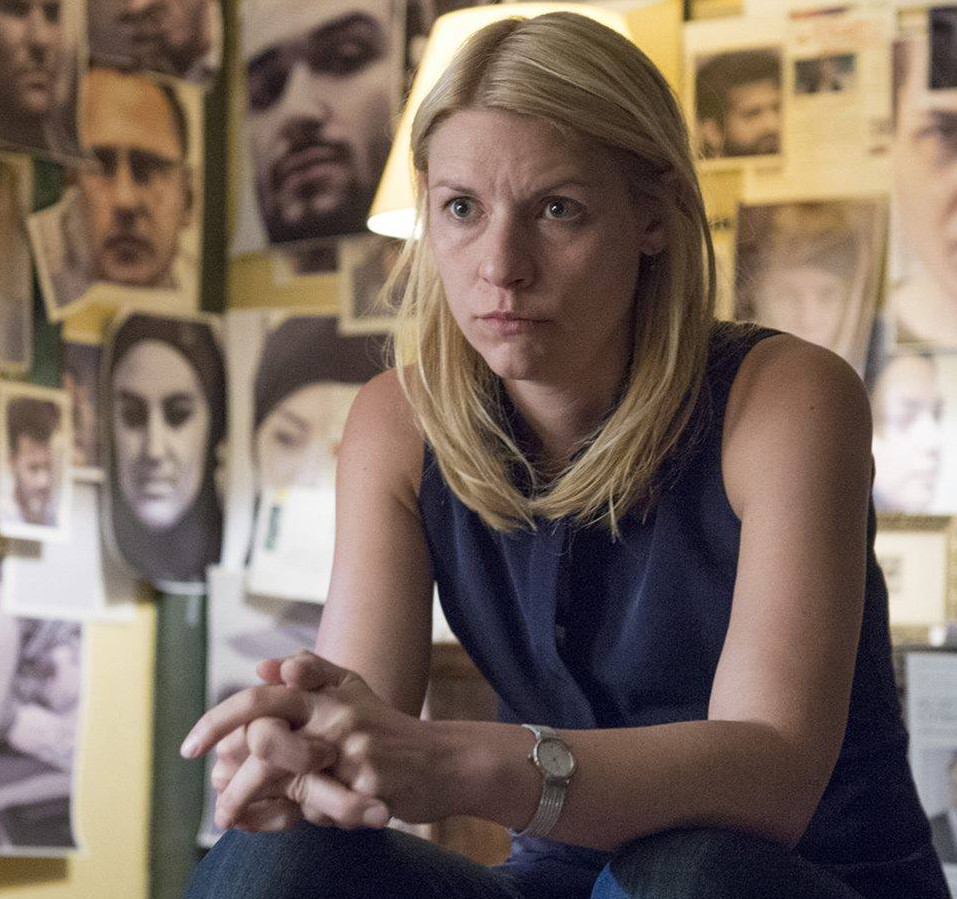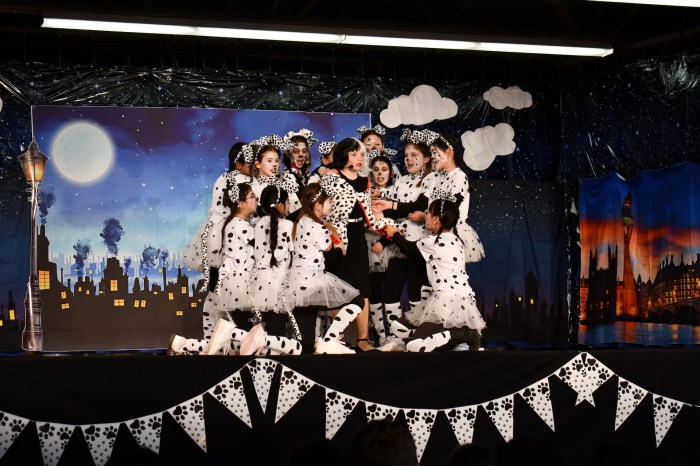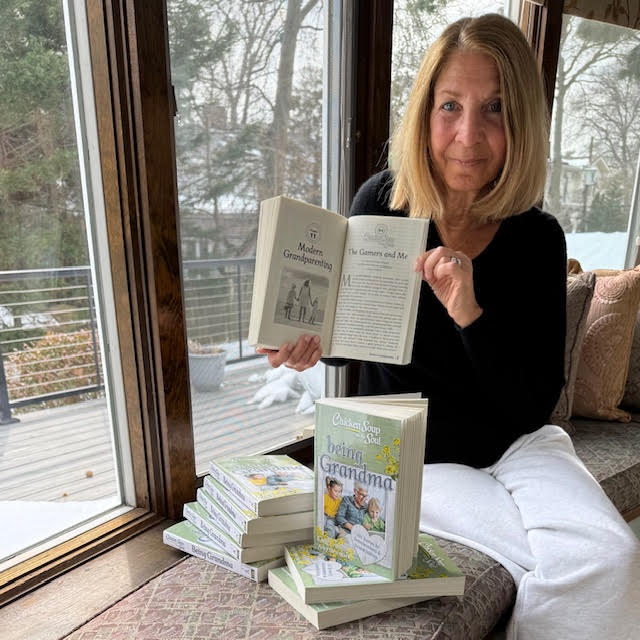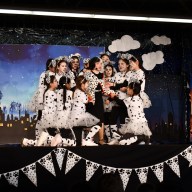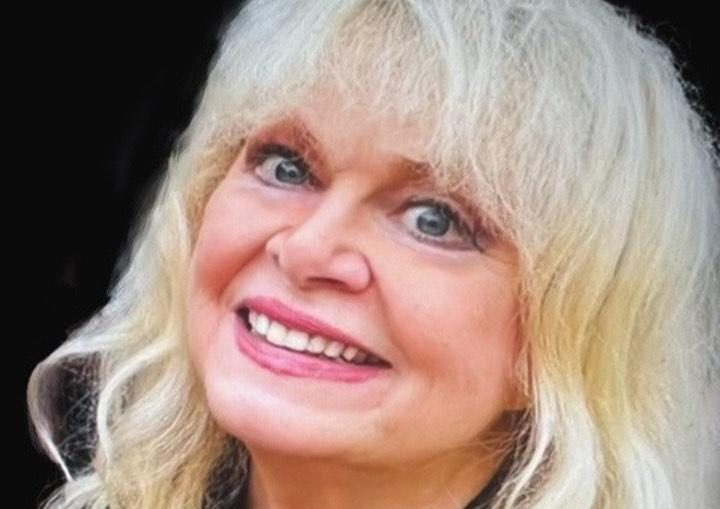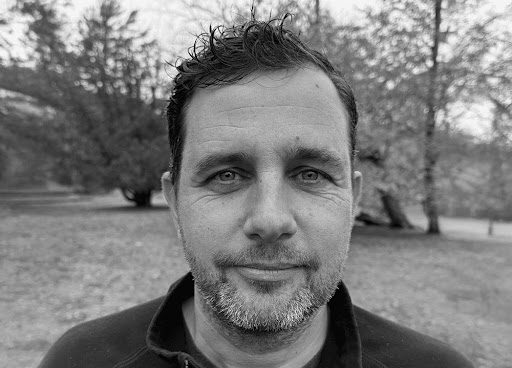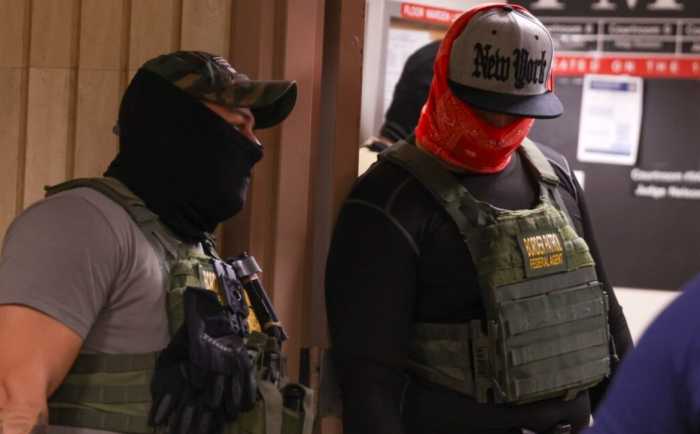By Jaime Franchi, Rashed Mian and Spencer Rumsey
Here’s the deal, season 5 of Homeland, one of the best, most important shows on television today, is rapidly heading to its thrilling finale this Sunday, December 19. We think it’s worth talking about, and this is what we have to say.
The Heroes—and the Villain—Are Women in this Season’s Homeland
This season of Homeland—its unequivocal, unquestionable, inarguable best—saw the women rise yet again as beacons of strength in an unsteady, chaotic and increasingly terrifying world.
Season 5 condemned badass assassin Peter Quinn to damsel-in-distress status, with head CIA honchos Saul Berenson and Dar Adal outplayed and outwitted with every heart-pounding, hair-pulling, throat-constricting twist and turn.
These twists were facilitated by the brilliant (and brilliantly evil) double-agent Berlin station chief Allison Carr, superbly played by actress Miranda Otto, and counter-balanced by the heroically-savvy Carrie Mathison, performed with wobbly-chinned perfection by Clare Danes. Returning to season 5 is Astrid (Nina Hoss), Carrie’s German counterpart, both in the intelligence community and as a former and sometime lover of Peter Quinn. The only female weak link is Laura Sutton (Sarah Sokolovic), a thinly-veiled nod to Emmy-award winning documentarian Laura Poitras, of Edward Snowden NSA-document leaking fame. Laura’s lack of appeal could possibly be traced to the annoying actress portraying her or the fact that in real life Laura Poitras is such a rock star that a petulant, self-righteous portrait just rings false.
Season 5 arrived two years after the end of the season 4’s action and in a brand new locale: Berlin. Here we find Carrie enveloped in domestic bliss: a bicycle-riding, healthy, loving mom, engaged in a functional relationship with yet another red-headed gent. It’s the perfect contrast to the horror of last season, when terrorists infiltrated the US embassy in Islamabad, Pakistan, slaughtering several people (including the heartbreaking Fara) and leaving Carrie and Saul’s relationship in seemingly irreparable tatters.
As fans of Homeland know, however, Carrie’s peaceful life couldn’t be long for this world. And, of course, it wasn’t.
By the end of the first episode, Carrie was summarily sucked back into the life she’d been trying to leave behind, plunged into the darkest depths of the CIA underbelly where evil and betrayal lie in wait in the form of yet another red-headed agent.
Season 5 takes its sweet time in revealing the vastness of Alison’s self-serving, ugly, survivalist soul.
She manifests it first in a cleverly placed assignment: a hit on Carrie by Agent Quinn. Then, as the series races to its finale, we see the true dimensions of her evil when Allison is willing to let thousands of civilians get locked in a Berlin subway station at rush hour, and she does nothing to prevent the release of sarin gas and their imminent tortured deaths, something Quinn describes in chilling detail in episode 9, “The Litvinov Ruse.”
“Sarin is a fucked up way to die,” he tells a hesitant terrorist. “It attacks the respiratory center of the nervous system, paralyses the muscles around the lungs. You convulse, you vomit, your bladder and your bowels evacuate.”
Late in the season, viewers watch (full disclosure: I did not watch; I hid under a blanket until it was over) these exact symptoms take over Quinn’s body as he is subjected to sarin. He is saved, kinda, by the administration of an antidote by a sympathetic terrorist whose cousin is the ring-leader behind the upcoming attack. Acting like knights in shining armor Carrie and Astrid rescue him while he’s still barely alive and take him to a hospital where he clings to life in a coma.
It is only Carrie and Astrid who can see through the dark dealings of Allison, a double agent working for the Russians, motivated by a love of money, men and the best daiquiris on the planet. It is Carrie who connects the two attempts on her life to the Russians and the leaked CIA documents to Allison. She unwinds Allison’s intricate plot, and her sleuthing traces the planned sarin attack to its rightful place, the subway, not the airport as Alison had led her male bosses to believe. Saul Berenson and Dar Adal, on the other hand, spend the season three steps behind her, captivated by Allison’s duplicitous subservience and deceived by her quick-witted manipulation and on-her-feet thinking. Every time we think Allison is about to be caught red-handed and exposed, she slips through Dar and Saul’s thick, inept fingers.
This Sunday’s finale will find Carrie single-handedly confronting the terrorist mastermind in a dark subway tunnel—the last vestige of hope for the Germans (and the CIA). Allison has made a hasty exit, squirreling away from Saul yet again, leaving him to realize what Carrie had already concluded. How the plot wraps up will undoubtedly be a satisfying end to an exciting season. I would love to see Allison subjected to a lengthy stint in a federal pen, all privileges-like her diplomatic-parking pass-revoked, instead of a martyr-making shootout. For added fun, how about a drinking game: Drink a beer every time Carrie busts out her wobbly frowny face.
-Jaime Franchi

Behind the Eerie Coincidences of ‘Homeland’ and Real News
Part of Homeland’s appeal this season—its strong female characters and deft storytelling notwithstanding—is how it has essentially followed real-life news events with chilling accuracy. From an attack in a major European city, wannabe terror goons contemplating traveling to Syria, and the debate within government agencies struggling to deal with ISIS, the show’s creators have essentially predicted world events as they’re happening—and it’s actually pretty fucking eerie.
Just weeks after the horrific attacks in Paris, the fifth season began following a group of ISIS posers plotting to release a deadly nerve agent in Berlin—and authorities there were none the wiser until our beloved foam-mouthed Quinn was used as a lab rat to warn fear-stricken German citizens that, unless the United Nations recognized the Islamic State as a legitimate state, it’d unleash hell on Earth.
Speaking of Quinn, he was the man CIA officials called in to debrief them inside a dimly-lit room at Langley (we assume) at the outset of the season and was greeted by dumb-struck questioners who, despite their vast resources, were incapable of implementing their own anti-ISIS strategy. We don’t know if the showrunners’ were making a political point—Republicans have criticized President Obama for not doing enough to take out ISIS—but Quinn, as usual, answered their sophomoric queries with brutal honesty. Either send troops and an equal amount of elementary school educators to Syria, he advised, or bomb Raqqa—ISIS’ home base inside Syria—“into a parking lot.” In Quinn’s eyes, there’s no middle ground. You either win over hearts and minds by giving people—young people in particular—hope for the future with legitimate educational resources while simultaneously picking ISIS apart on the battle field, or you bomb the hell out of Raqqa until nothing’s left—civilian casualties be damned.
Let’s come back to real life for a second. Quinn’s suggestions are very telling because he’s giving American viewers a glimpse into how own government is confronting ISIS. There are many who believe that the real battle being fought is the one over ideology. ISIS has taken advantage of social media to expand its reach and has been adept at recruiting followers from Western nations by convincing them that the West is at war with Islam. So when presidential candidates like Donald Trump spout anti-Islam rhetoric and persecute an entire religion, experts argue, that prejudice plays right into ISIS’ hands. Once ISIS has sympathizers in its grasp, it convinces them that a prophesized apocalyptic battle inside Syria is upon us, pitting Muslims against the West.
It’s obvious that Homeland’s showrunners have done their homework.
In last Sunday’s episode, Carrie confronts a member of Hezbollah living in Germany so she can gleam information out of him about the terror cell threatening Germany.
“You’re soldiers involved in a political struggle,” Carrie tells the man, who doesn’t trust her. “These are zealots prophesying…a countdown to the apocalypse.”
“Like I said,” the man responds, “idiots, scum.”
For those who have covered ISIS’s meteoric rise, this obsession with the apocalypse is nothing new. But for many viewers whose only image of ISIS is of masked men beheading and immolating apostates, this apparent infatuation with a world-ending battle for the ages may come as a shock.
Americans, too, are infatuated with the end of the world, but that’s only during episodes of The Walking Dead, and shows and movies of its ilk.
To prepare for this prophesied battle, ISIS has gone as far as seizing an entire city they believe will be the site of this epic war with the West. (Do yourself a favor and check out these series of tweets by New York Times reporter Rukmini Callimachi to better understand ISIS’ strategy.)
“ISIS invested significant resources into taking the Syrian town of Dabiq last summer,” according to Vox. “Dabiq has minimal military significance, but figures prominently in some of the apocalyptic prophecies that ISIS uses in its propaganda.”
Homeland fans familiar with Fox’s post-9/11 thriller 24—also written and produced by Homeland’s Howard Gordon—would acknowledge that the writers never went this far to explain to its audience what truly drives the bad guys. But Homeland, at least this season anyway, has chosen to get in the minds of the fictional terrorists we’re watching on our TV sets. When you look deeper, you realize the ISIS they’ve created for our viewing pleasure isn’t fiction at all—and that’s why this season of Homeland is worth watching.
But it also begs the question: if Homeland is so effective at leveraging current-day issues to better inform its story, why did it allow itself to self-destruct after season 1?
-Rashed Mian

‘Homeland’ Has a Lot to Answer For in Season 5
This season of Homeland is embedded so deeply in the entertainment cortex of my brain that I can’t even remember the other four years without evoking some infuriating memories about characters I miss and those I couldn’t wait to banish (I’m looking at you, Brody, and your annoying daughter, too). But this year the show is riding a wave of intense political and cultural consideration that is so combustible it’s almost hard to talk about without igniting some heated argument.
And that’s just the backstory about Homeland’s alleged racism and bigotry. Subjecting all the plot concatenations to critical analysis is another sore point. Selling out the free world for the best daiquiris in the Caribbean? Come on! Make Allison a closet Marxist revolutionary cadre member with a fixation on Herbert Marcuse, not an aging debutante who longs to party on the beach with her renegade boyfriend at Banana Joe’s—unless the joint is really named after Joseph Stalin. Now that would be a twist!
Meanwhile, as the finale looms ahead, the Berlin U-bahn is about to become a sarin-gas oven—if the evil guys aren’t stopped in time by our intrepid duo of Carrie and Astrid (Nina Hoss, whose eyes seem to encompass Western Civilization if you stare into them long enough).
I’m worried about Quinn. That guy is my favorite CIA assassin ever. You know he suffers—and this season, oh my God, that pain runs deep down.
But he plays an important role in this show, always has. But I didn’t foresee that Quinn would be the one speaking truth to power in some Pentagon/CIA basement conference room when he was brought in from the hot zone to describe how our Syria campaign is all fucked up. As the Vanity Fair’s culture critic, James Wolcott, rightly pointed out, it is a great exchange of opinions. The comfortable bureaucrat asks him: “Is our strategy working?” Quinn replies: “What strategy? Tell me what the strategy is and I’ll tell you if it’s working.”
The other side, Quinn reminds his superiors, does have a plan: “They call it the end times… They’re there for one reason and one reason only: to die for the Caliphate and usher in a world without infidels. That’s their strategy and it’s been that way since the seventh century.”
He concludes that a few more pairs of special-ops’ boots on the ground might not be enough. More like a quarter million. Too bad the Republicans didn’t quote Quinn’s figures during their recent debate in Las Vegas, but then Homeland might be too liberal for their taste, especially when it was reported that President Obama watched it Sunday nights in the White House. Besides, they’re probably bigger fans of 24, the Fox thriller that came to an end when Jack Bauer finally ran out of time.
Emily Nussbaum, the insightful TV critic for The New Yorker, called Homeland the “antidote” for 24, which she described as “a well-made fun machine, a sleek right-wing dreamscape with just enough moral ambiguity to elevate it above a Road Runner cartoon.” Tellingly, Homeland’s creators, Howard Gordon and Alex Gansa, both former writers of 24,took the idea for this series from Hatufim, an Israeli drama about prisoners of war. But these two show-runners have been taking some heat themselves for the critical choices they’ve made in Homeland. And I think it’s rightly deserved, but hypocrite that I am, I will watch every minute of it.
This summer when the show was being shot in Berlin a group known as The Arabian Street Artists got onto the set and added a slew of subversive graffiti on the walls of what was supposed to be a Syrian refugee camp: “Homeland is NOT a series,” “Homeland is racist,” “Homeland is a watermelon [aka a joke]” and “The situation is not to be trusted.” They were hired to tag the scenes with pro-Assad slogans. No dice. They did their work in plain sight, right under the eyes of the producers.
But, as the artists later explained in a statement, “Arabic script is merely a supplementary visual that completes the horror-fantasy of the Middle East, a poster image dehumanizing an entire region to human-less figures in black burqas and moreover, this season, to refuges. The show has thus created a chain of causality with Arabs at its beginning and as its outcome—their own victims and executioners at the same time.”
Gordon and Gansa conceded they were tricked but defended the show’s integrity and insisted their narrative wouldn’t recapitulate the same old stereotypes as the villains. Clearly that’s a bone of contention, depending on your point of view. Russians can’t be too happy with the story line.
But we’re all victims in the West, and we’re all complicit, too, especially those from the countries that divvied up the Arab world after 1917. In light of the recent Paris attacks, when Muslims were among the massacred victims at the sidewalk cafes, murdered for the crime of enjoying themselves on a Friday night, we saw once again how indiscriminate the killers could be in choosing their targets. I’m sure that it’s that added context of randomness which makes watching Homeland more than the usual escapist fare.
I doubt that Homeland is the “most bigoted show on television,” as some critics say, but I wish it had a better answer to appease them.
On the other hand, it seems to be the only program outside of a documentary on PBS that is even tackling these underlying themes in a compelling, intelligent manner for a mainstream audience.
“I don’t know if Homeland is the best show on television, whatever that means,” writes Wolcott in Vanity Fair, “but it’s the most important show on TV in 2015, and not just because of its powers of prognostication. It’s gotten under the anxious skin of the here and now with heightened realism rather than by raising a fantasy construct or adding ornate wings to its own mythology.”
On its theatrical merits alone, this season of Homeland reminds me of how I felt spending my Sunday nights watching the thrilling original CBS series, Mission: Impossible, which first aired in 1966. Instead of a dweebie NSA insider like Edward Snowden, the show introduced us to Daniel Briggs (Steven Hill), a tweedy professorial ring-leader in charge of a covert group of Americans carrying out top-secret missions with ingenious high-tech equipment, brilliant deception and old-fashioned derring-do. The original cast included Greg Morris as Barney Collier, the brainy wizard behind the gadgetry—going against the cultural stereotype, this genius was played by an African-American actor, although typical for the time, he was never allowed a love interest—plus Martin Landau as Rollin Hand and Barbara Bain (sigh!), as Cinnamon Carter.
Every episode was a riveting hour of adrenaline-pumping action full of intrigue and suspense. You knew they would win, they had to win or there would have been uprisings in the streets of suburbia across our great nation, but you could never guess how. The enemies were always either corrupt Communist villains from the Soviet Bloc or ruthless despots from South America, some with despicable Nazi ties. You never thought twice about their own cultural context, you took their two-dimensional characters as a given. It wasn’t heavy-handed, chest-pumping propaganda. I just never thought those villains were out there trying to kill us; I just worried about them killing Cinnamon, I mean, Ms. Carter and her team. And, of course, I occasionally worried about those nuclear missiles the Soviets had aimed at our house.
Now, in Homeland, we can rest assured that Carrie, Astrid, Saul and even that duplicitous Dar Adal will find a way to save Berlin. What happens to that treasonous Allison is another story. But whether a TV show can save civilization from itself is a burden no work of art, let alone mass entertainment, should have to bear alone. We shall see how it goes.
-Spencer Rumsey




